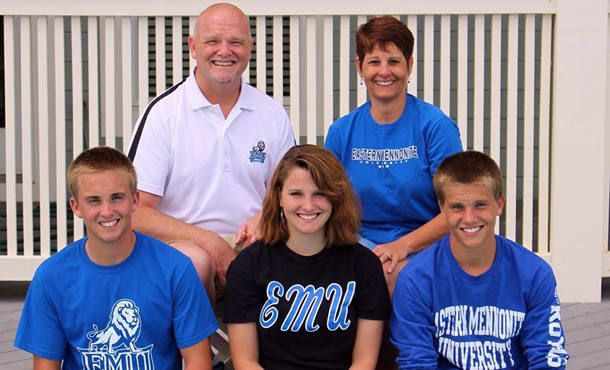Dig a bit into the student population of this “Christian university like no other” and you’ll find about 100 who are sharing their campus experience with siblings.
Basketball players, religious studies majors, Iraqi STEM students, and missionary kids are among the siblings who have chosen to attend Eastern Mennonite University together. Some commute from nearby homes; some crossed the continent to get here; some are Mennonite, but many aren’t.
The EMU database contains 46 family names associated with siblings enrolled in the fall of 2014. Three families have a trio of offspring enrolled, including two sets of parents who themselves graduated from EMU: Steve and Lois Alderfer, class of 1986, parents of first-year Andrew, third-year Josh, and fourth-year Elizabeth; and Pat and Kathy King, class of 1981, parents of triplets who are sophomores, Emma, Isaac and Rachel. A third trio of sophomores includes Kennedy I. Okereke, and twins Chidera T. and Chinazo A. Nwankwo, children of Theodora Nwankwo.
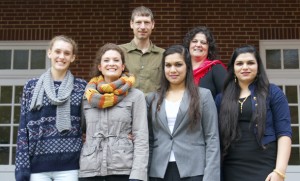
“Something very profound takes place for both the family and the EMU community when siblings share a common college narrative,” says Luke Hartman, vice president for enrollment. “Experiencing Mennonite education can strengthen the family while at the same time benefiting the college with the sharing of their individual strengths and uniqueness.”
Not surprisingly, the largest cluster of siblings (14 sets) come from Harrisonburg and vicinity, but some siblings have traveled hundreds of miles in Virginia to attend EMU, including a pair each from Bristol on the Tennessee border and from Chesapeake on the Atlantic.
Other home states of siblings: Pennsylvania (12 families in nine municipalities); Ohio (eight families, all in different locations), two sets of siblings from Maryland, and one set each from Goshen, Indiana; Wellman, Iowa; Rochester, New York; Plymouth, Minnesota; Puyallup, Washington; and Charles Town, West Virginia.
The 46 surnames of siblings culled from EMU’s database in October 2014 are: Alderfer, Baltimore, Barrett, Beachy, Bills, Bishop, Blosser (two different families), Clemens, Cox, Driediger, Dutcher, Ferrell, Gallardo, Gish, Gonzalez, Graber, Hartzler, Jones, Kauffman, King, Kiser, Kratz, Longenecker, Luther, Mack-Boll, Mansoor, Martin, Mast, Miller, Mumaw, Myers, Nafziger, Nussbaum, Okereke, Patterson, Poplett, Raber, Salladay, Shenk-Moreno, Sprunger, Treichel, Trotter, Weaver, Wengerd, Ygarza, and Yoder.
Interviews with three sets of EMU siblings yielded this common thread: They tend to maintain separate identities and friend groups, while supporting and inspiring one another – be they healthcare providers like the Ardrons, budding psychologists like the Treichels, or activist musicians like the Popletts.
“Even though the siblings may have very different experiences here, they will have the same alma mater, a bond which will benefit both themselves and our entire community over the long term,” observes Hartman.
The Ardrons
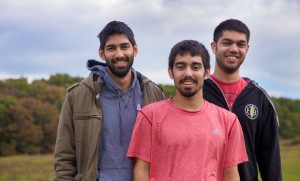
Last year, the three Ardron brothers – Austin, Adrian, and then first-year student Aaron – all commuted to campus from their home in Fishersville, 30 miles south of Harrisonburg. The attraction of EMU was its strong reputation in nursing and pre-med preparation.
With both a mother and a father who are nurses, the Ardron brothers come from a family of healers. Among their immediate and extended family are more nurses, pharmaceutical representatives, physical therapists, an ophthalmologist, and a pediatric allergist.
“It’s just what we’re drawn to … we’re good at medicine, at making people feel better,” says Austin, who wrapped up his EMU coursework this summer, passed his nursing boards, and started as a registered nurse at the University of Virginia (UVa) hospital – all within 30 days.
As the first to enroll, Austin came to EMU because of the “holistic approach” to nursing, which emphasizes emotional as well as physical healing. Now working on the medical-surgical floor, Austin applies this mindset to patient advocacy, what he terms “explaining in human terms what the doctor just said.” He also values his ability to be a comforting presence and “that extra safety net for the patient” before procedures.
Austin’s older brother, Adrian, started at the College of William and Mary and circulated among a couple of university settings and majors before following Austin into the nursing program. Also a 2014 graduate, he now works as a registered nurse in UVa’s urology, surgery and burns unit.
Aaron based his college decision partly on his brothers’ positive experience. The pre-med major was also impressed by EMU graduates’ nearly 90 percent acceptance rate into medical school.
Commuting from home has allowed the Ardron brothers to gain work experience, and to maintain close ties to their family and their Seventh Day Adventist church.
Austin paid his way through school by working as a nurse’s aide at UVa. For all four years of college, he attended school Monday through Friday, and worked 20 hours over the weekend.
Aaron’s extracurricular activities take the form of church leadership: he is a head deacon at his family’s church. The Seventh Day Adventists’ calling is “to help heal, help promote growth,” he says. That environment shaped his interest in helping people through medicine. After many years of schooling, he hopes to carry on the family’s healing tradition as a healthcare professional in an intensive care or trauma setting, perhaps as a cardiac or ocular surgeon.
The Treichels
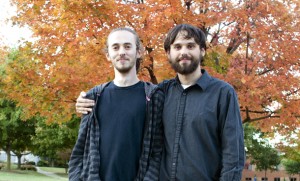
Shawn and Kevin Treichel’s childhood instilled in them a fascination with the human mind and an appreciation of brotherhood. From Kevin’s perspective, many people coming to college see their siblings as an annoyance, and their family as a constrictive atmosphere to leave behind. But the Philadelphia-raised brothers grew up without an intact family to chafe gently against – they were in and out of foster care.
Some students enter college lacking independence and resilience. Not these brothers, says Shawn: “We’ve been to youth delinquent centers for a year at a time …We can do college!” (In the Philadephia area, the centers often double as temporary homeless youth shelters.)
Shawn was the first to learn about EMU. His family began attending a Mennonite church after an event flyer was posted on their door. Through that youth group, he became acquainted with Lani Prunés ’14. Her descriptions of EMU helped sway him from the original conviction that he would not pursue post-secondary education. He is now a third-year psychology major whose studies may lead to graduate program for counseling; however, he’s waiting to see what opportunities life brings: “I’ve never really had a straight and narrow path,” he explains.
Kevin is also at EMU because of those church connections. He came in knowing he wanted to go into nursing, and liked EMU’s reputation in that field. Specifically, he says, “I want to work in a psychology setting with children.” He plans to attend graduate school for a masters in applied behavioral analysis.
“The end goal is to have the knowledge and the context in order to take a much more holistic approach towards psychology than I ever witnessed myself,” he says.
Coming to EMU, the Treichels had to adapt to both small-city living and local culture. If they drive five minutes in their home setting, they’ve made two blocks; if they drive five minutes here, they’re in a cornfield. Neither of the brothers see themselves returning to Philadelphia. “Been there, done that,” says Kevin.
Wherever their careers take them, the Treichels express appreciation for having attended EMU simultaneously and maintaining their mutually supportive relationship.
“It would probably be weirder not being on campus with my brother,” says Kevin. “Due to our specific circumstances, we learned pretty early the value of relying on family.”
Yet, he adds, EMU might still be the right choice for siblings who don’t feel as close as he and Shawn. “The [campus] world’s not as small as you might think it is.”
The Popletts
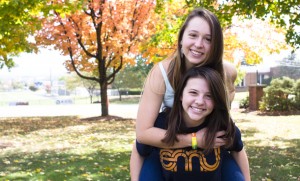
Alicia and Katrina Poplett, of Plymouth, Minnesota, grew up immersed in music, listening to their mother playing piano. Competition between the two young violinists became “a quite contentious part of our lives!” says Katrina, who switched to the viola in eighth grade. Thereafter they played together in school and in Mennonite church groups with less angst.
In the high school pit orchestra, the year before Alicia left for EMU, “we started becoming friends,” says Katrina.
Alicia is now a junior majoring in elementary education and Spanish.
After two years of visiting her sister on campus and feeling “very at home here,” Katrina arrived this fall to study peacebuilding.
Again attending school together, the two have built upon their high school bond, sharing yoga classes and musicianship.
Yoga is Alicia’s interest, but “Katrina begrudgingly comes along,” Alicia says. “She has a lot of strengths, but sitting still and perhaps balancing are not some of them.” The two exchange smiles over antsiness and arduous poses during class.
The sisters also still practice music together, their individual skill augmented by the ability to read one another well. Sometimes, though, they still need to take breaks to cool down between instrumental arguments.
The sisters hope to enter humanitarian work after graduation. Alicia imagines teaching overseas or in an inner city school – “somewhere that would continue to challenge me!” Katrina sees herself working with women and children in a foreign context.
Wherever they go, the sisters want to make a difference, a goal that stems from their upbringing: “We were raised to be involved and to be present where you are,” says Katrina. An example of this was their recent participation in the New York City People’s Climate Rally on Sept. 21. “It took stamina!” says Alicia, of the three-mile walk with more than 400,000 participants.
Their mantra of presence and involvement also applies to their relationship. Alicia recommends attending college with a sibling, as it’s an interesting way “to both grow together.”
Katrina has especially appreciated the presence of someone who knows her well as she transitions to university life. The hardest thing about starting college, she explained, is the absence of peers who know you deeply. Even though Alicia has been Katrina’s “in” to social networks, people on campus do not treat the sisters as one unit.
“You are related, but you’re your own person,” says Katrina.
